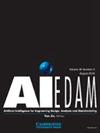智能系统功能设计的场景集成方法
IF 2.3
3区 工程技术
Q3 COMPUTER SCIENCE, ARTIFICIAL INTELLIGENCE
Ai Edam-Artificial Intelligence for Engineering Design Analysis and Manufacturing
Pub Date : 2021-01-05
DOI:10.1017/S0890060420000487
引用次数: 2
摘要
摘要功能设计被认为是一种设计活动,主要目的是澄清客户需求,并为正在开发的系统开发功能架构和解决方案概念。现有的功能设计方法主要集中在如何帮助设计者为所需产品寻找解决方案原则上,然而,这些方法没有充分考虑正在开发的智能系统与其环境之间的交互,也不能明确地表示系统的复杂功能逻辑,导致它们不能有效地帮助设计者进行智能系统的功能设计。因此,本文提出了一种智能系统功能设计的场景集成方法来解决上述问题。基于软件工程中的场景概念,该方法明确阐述了如何使用场景来表达客户的主观需求,以及如何通过结构化过程生成功能架构和相应的解决方案概念。以智能汽车车门自动解锁系统的功能设计为例,说明了该方法的适用性。本文章由计算机程序翻译,如有差异,请以英文原文为准。
A scenario-integrated approach for functional design of smart systems
Abstract Functional design is regarded as a design activity primarily aimed at clarifying customer needs, and developing the functional architecture and solution concepts for a system under development. Existing functional design approaches are mainly focused on how to assist designers in searching for solution principles for desired products, which, however, do not adequately take into account the interactions between a smart system under development and its environment, and cannot explicitly represent the complex functional logic of the system, resulting in that they cannot effectively assist designers in the functional design of smart systems. Therefore, this paper proposes a scenario-integrated approach for functional design of smart systems to address the above issues. Based on the concept of scenario in software engineering, the proposed approach explicitly elaborates how to employ scenarios to express subjective customer needs and how to generate the functional architectures and the corresponding solution concepts through a structured process. The functional design of the automated doors-unlocking system of a smart vehicle is employed to illustrate the proposed approach, which also demonstrates that the proposed approach is suitable for functional design of smart systems.
求助全文
通过发布文献求助,成功后即可免费获取论文全文。
去求助
来源期刊
CiteScore
4.40
自引率
14.30%
发文量
27
审稿时长
>12 weeks
期刊介绍:
The journal publishes original articles about significant AI theory and applications based on the most up-to-date research in all branches and phases of engineering. Suitable topics include: analysis and evaluation; selection; configuration and design; manufacturing and assembly; and concurrent engineering. Specifically, the journal is interested in the use of AI in planning, design, analysis, simulation, qualitative reasoning, spatial reasoning and graphics, manufacturing, assembly, process planning, scheduling, numerical analysis, optimization, distributed systems, multi-agent applications, cooperation, cognitive modeling, learning and creativity. AI EDAM is also interested in original, major applications of state-of-the-art knowledge-based techniques to important engineering problems.

 求助内容:
求助内容: 应助结果提醒方式:
应助结果提醒方式:


